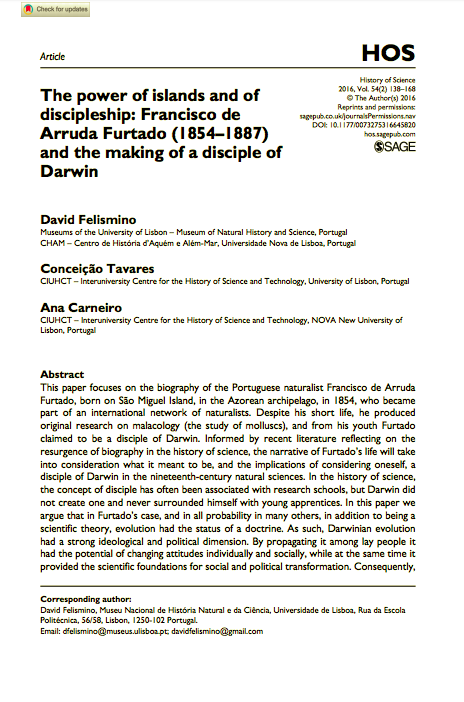The Power of Islands and Discipleship: Francisco de Arruda Furtado (1854–1887) and the making of a Darwin’s disciple
- Author(s)
David Felismino, Conceição Tavares e Ana Carneiro
- Year
- 2016
- Journal
History of Science, 54 (2)
- Nr. of Pages
- 138–168

Abstract
This paper focuses on the biography of the Portuguese naturalist Francisco de Arruda Furtado, born on São Miguel Island, in the Azorean archipelago, in 1854, who became part of an international network of naturalists. Despite his short life, he produced original research on malacology (the study of molluscs), and from his youth Furtado claimed to be a disciple of Darwin. Informed by recent literature reflecting on the resurgence of biography in the history of science, the narrative of Furtado’s life will take into consideration what it meant to be, and the implications of considering oneself, a disciple of Darwin in the nineteenth-century natural sciences. In the history of science, the concept of disciple has often been associated with research schools, but Darwin did not create one and never surrounded himself with young apprentices. In this paper we argue that in Furtado’s case, and in all probability in many others, in addition to being a scientific theory, evolution had the status of a doctrine. As such, Darwinian evolution had a strong ideological and political dimension. By propagating it among lay people it had the potential of changing attitudes individually and socially, while at the same time it provided the scientific foundations for social and political transformation. Consequently, in addition to scientific research based on Darwin’s theory, Furtado deeply engaged in proselytizing the natural sciences and Darwinian evolution, becoming representative of the importance of Darwin’s disciples in Furtado’s sense, in the reception and endorsement of evolution around the world, with repercussions beyond natural history.